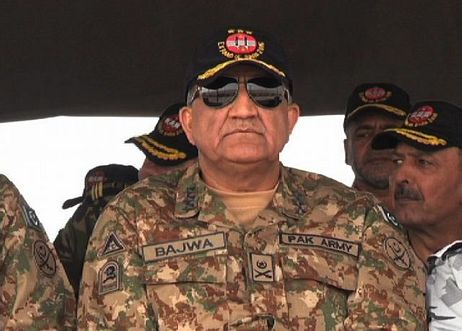The Supreme Court of Pakistan has suspended a government-issued directive that approved a three-year term extension for the current chief of army staff. It’s an extraordinary development, as never in the country’s history has a court intervened to question — let alone suspend — an army chief’s extension or appointment.
The current army chief, General Qamar Javed Bajwa, will see his constitutionally fixed three-year tenure ended on Friday, November 29. After three days of hearings, the court has decided to give Bajwa six months’ extension with a condition that the parliament will amend the constitution to find a permanent solution to the issue. Regardless, the situation will have far-reaching implications for Pakistan’s politics. The case’s hearing not only challenged the technicalities presented by the government, but has also asked some fundamental questions concerning the entire subject of army chief term extensions.
To begin with, the Supreme Court didn’t have to intervene in the army chief extension debate, particularly after the original petitioner withdrew the case. However, the court overruled the application to withdraw the petition, stating that the case fell into the “domain of public interest under Article 184 (3) of the Constitution.” The Supreme Court’s forceful involvement is a extraordinary development that has raised concerns as to whether the intervention is an independent decision or if something else is at play.
The court intervened because there were glaring technical errors in the appointment summary issued by the government. Ironically, the prime minister’s office’s notification of Bajwa’s extension was never signed by the president of Pakistan after the cabinet’s approval. Moreover, the government has used Article 243/245 of the constitution to extend the army chief’s tenure. However, the court ruled that these articles cannot be used for a military chief’s extension. Arguably, in this case, the court is not only flexing its muscles, but also blaming the government for creating a crisis. It’s unclear why the decision to extend the military chief’s tenure was handled in such a poor manner by the government, and the crisis now looks sets to deteriorate the government’s relationship with the military’s top brass.
The debate in the court has also focused on evaluating whether the entire business of offering an extension to military chiefs is constitutional. In his remarks on the attorney general’s reasoning that the extension is needed because of the dire regional security threat, the chief justice of the Supreme Court said:
If at all there is any regional security threat, then it is the gallant armed forces of the country as an institution which is to meet the said threat and an individual’s role in that regard may be minimal. If the said reason is held to be correct and valid then every person serving in the armed forces would claim re-appointment/extension in his service on the basis of the said reason.
Furthermore, one of the Supreme Court judges asked the attorney general “where was it written that a good officer could be given an extension?”
As of now it’s unclear whether the government can amend the constitution, as that requires a two-thirds majority in the parliament. In order to extend Bajwa’s tenure beyond six months, the government will have to work with all mainstream opposition parties, which is not going to be an easy task. After six months, if Bajwa is forced to leave his position, the consequences could be disastrous. The issue is now being framed as the judiciary intervening in the domain of the military, which has never appreciated such activism in the past.
If the court has jumped into this tough situation, it needs to make sure that the issue ends within the constitutional framework, as it raises a serious question about the balance of power among the state institutions. It’s already clear that the court’s intervention has created a precedent that a military chief’s extension can be challenged and possibly invalidated. To an extent, this will serve as a deterrent in the future when it comes to any government deciding on the issue.
Besides everything else, the non-stop media and court scrutiny are embarrassing — not only for the serving army chief, but also for the entire institution of the Pakistani military, considering how much work goes into keeping its positive public perception.

No comments:
Post a Comment